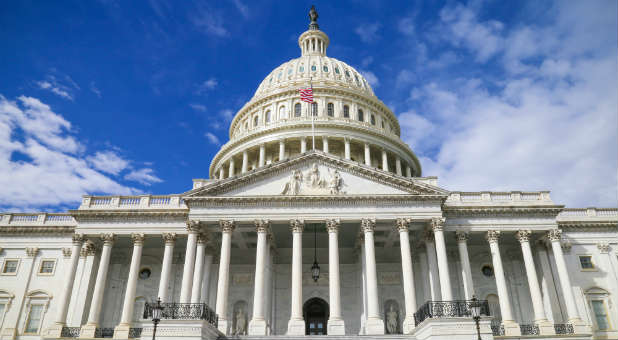Why It’s Unacceptable for Christians to Stand on the Political Sidelines
Senator James Lankford (Oklahoma) once invited an audience to “name one book in the Old Testament that is not written by, to or about political leaders.” He then offered, “I think there are three in total. I’ll make you figure out the three … Job is one.”
And yet, over the last century theological heresy has so adulterated modern Christendom that seminaries appear to be yielding disciples cast in the mold of Epicurus. “We don’t do politics,” they highbrow with a whiff of Epicureanism, an arcane academic approach where the rough and tumble of civic responsibility is shunned for a more peaceful, happy and tranquil life.
In order to juxtapose early American Christianity to the modern version, let’s take two paragraphs from B.F. Morris’ 1864 classic The Christian Life and Character of The Civil Institutions of The United States:
The persecutions of the Puritans in England for non-conformity, and the religious agitations and conflicts in Germany by Luther, in Geneva by Calvin, and in Scotland by Knox, were the preparatory ordeals for qualifying Christian men for the work of establishing the civil institutions on the American continent. ‘God sifted’ in these conflicts ‘a whole nation that He might send choice grain over into the wilderness’; and the blood and persecution of martyrs became the seed of both the church and the state.
It was in these schools of fiery trial that the founders of the American republic were educated and prepared for their grand Christian mission, and in which their faith and characters became strong and earnest with Christian truth. They were trained in stormy times, in order to prepare them to elaborate and establish the fundamental principles of civil and religious liberty and of just systems of civil government.
There is a staggering lack of biblically-based knowledge and impact in America’s public square. Secularism, Christianity’s chief competitor, thrives solely in the absence of morality, and Christians have handed over the culture and its mountains of influence to those in rebellion against God. Any casual observer will recognize that secularism’s dominance of academia, newsrooms, sports, the courts, big business, Hollywood and medicine is a direct result of Christians “not doing politics.” It would seem that modern Christianity is “not doing education” either, given that the secular worldview now is being spoon-fed to 85% of America’s youth. Until Christians step into the public square, reestablishing a biblically based culture, the “sexualization” and secularization of youth, allied and abetted by Hollywood and media cliques, will continue to bring the nation to ruin.
“Politicians are actors performing a script, written by the audience,” Russell Kirk observed. But since politics is downstream from culture’s upper tributaries, secularists control the source by riding herd on public education, methodologies and teaching strategies through secular power structures.
In founding America, Christians initiated a biblically based culture, which in turn produced outstanding men and women of character, whose customs, traditions and moral laws and standards brought forth an exceptional America. For a nation is not exalted by its military prowess or Gross Domestic Product, but by its righteousness (Prov. 14:34).
The Founding Fathers established the Bible as the anchor and cornerstone in order to judge, thereby inducing unity, structure and shape, which in due course joined a people together, and so fashioned a unique culture that came to be known as American Exceptionalism.
Which brings us to Time magazine’s untimely cover story “First Family” and “devout Christian” Pete Buttigieg. Time magazine national correspondent Charlotte Alter framed the puffed-up propaganda piece as “news” by describing Buttigieg as “openly gay, happily married, a veteran who served in Afghanistan” and a “devout Christian.” She says Chasten (Pete’s homosexual lover and spouse) is a “big political asset because it allows him to position himself as a happily married, devoutly Christian family man who happens to be gay.” She says, “his marriage symbolizes what is politically possible in the United States of America.”
Time’s editor at large, special projects Paul Moakley provides a peek into the mindset of those managing the headwaters of the cultural mountains of influence in America. On cloud nine for producing the Time cover story on an “openly gay presidential candidate,” Moakley exulted on Instagram: “Growing up as a gay kid in a conservative community at the height of AIDS, I never imagined I’d be producing the covers of @time, especially one with an openly gay presidential candidate. Thank you to @pete.buttigieg and his husband @chasten.buttigieg for opening their lives and home to us.”
What do we do?
Ronald Greer tells of the dark days of Nazi takeover of Holland with Gestapo everywhere and Jews vanishing. Dutch Christians asked Dutch Reformed theologian, linguist and missiologist Hendrik Kraemer (1888-1965) what they should do. He said: “I cannot tell you what to do, but I can tell you who you are. If you know who you are, then you will know what to do.” Kraemer then read to those fearful Christians the words first spoken to the early fearful Christians in 1 Peter 2:9: “You are a chosen race, a royal priesthood, a people claimed by God as his own, to proclaim the triumphs of him who called you out of darkness into his marvelous light.” The people thanked him, left, and started the Dutch underground resistance.
Gideons and Rahabs are beginning to stand.















































